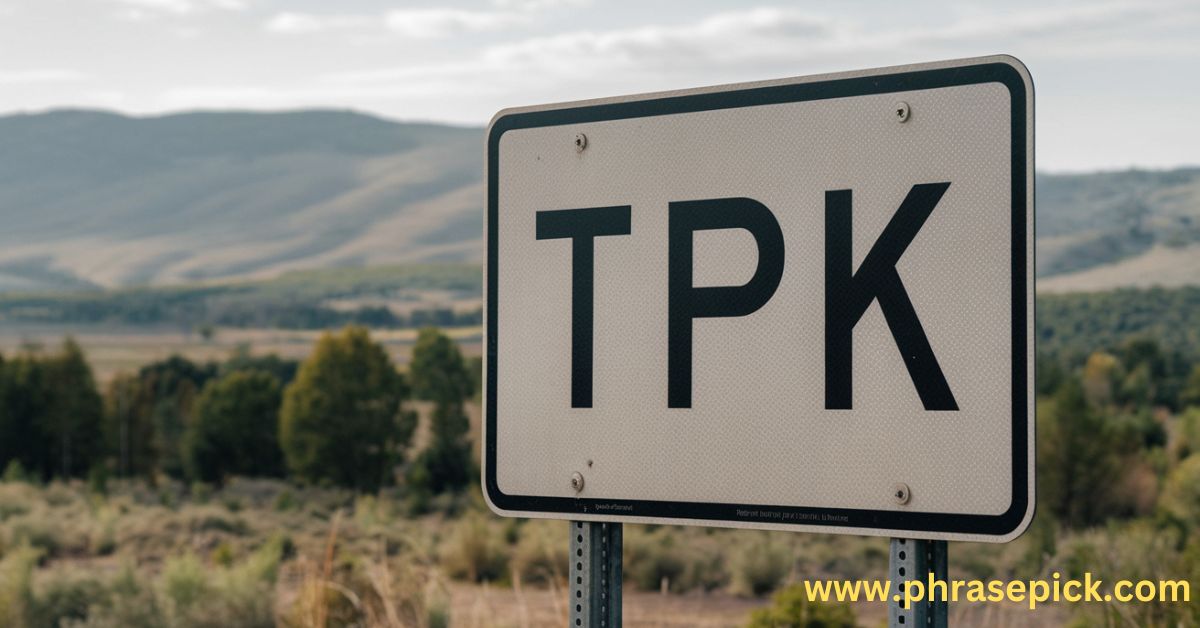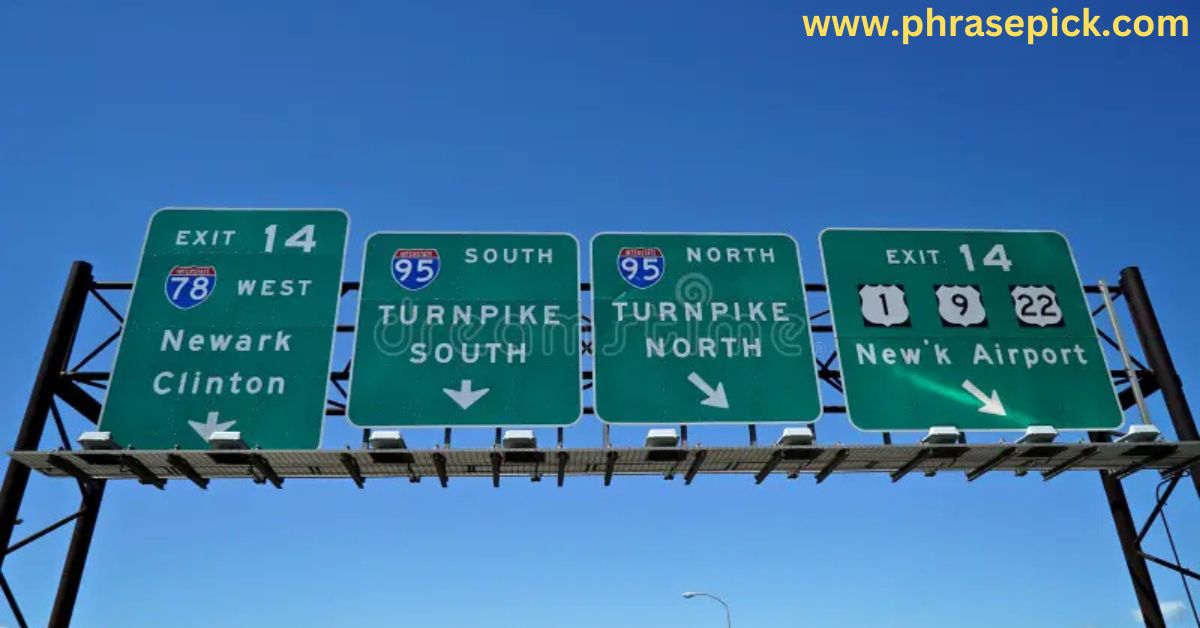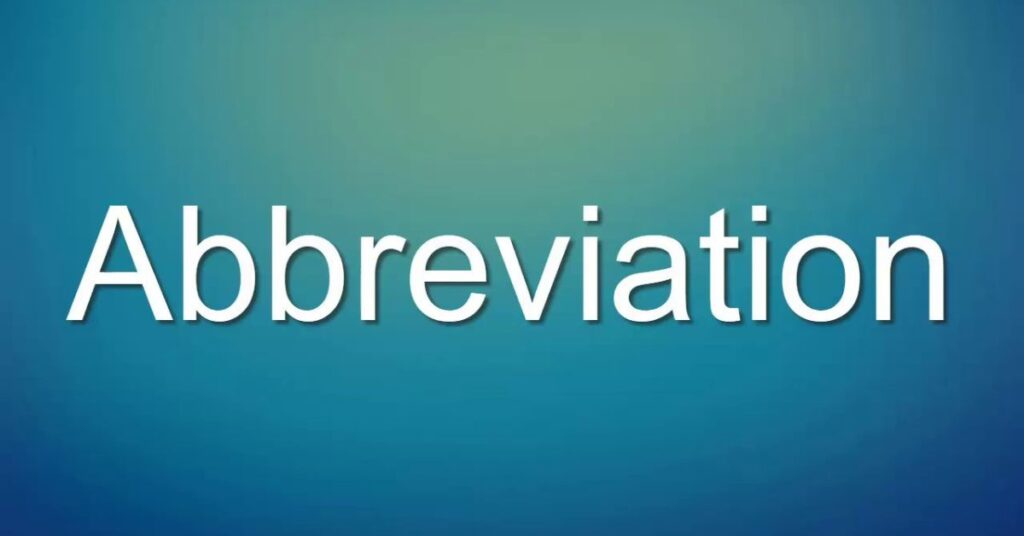Turnpikes are a central part of the U.S. road system, offering convenient, high-speed travel routes for commuters, long-haul truckers, and travelers alike. These highways, often marked by tolls, make it easier to reach cities or destinations that could otherwise take much longer on smaller roads.
Commonly abbreviated as TPK, turnpikes are more than just toll roads they play a vital role in connecting regions and boosting local economies. But what exactly does the term “turnpike” mean, and how did it become a key part of American travel?
In this article, we’ll dive into the meaning and definition of turnpikes, discuss how to use their abbreviation, and uncover some fascinating facts about their history. So, whether you’re new to the term or just curious, this guide will offer a complete understanding of turnpikes, their abbreviation, and why they matter in modern travel.
Abbreviation for Turnpike: Definition & Meaning and Usage

Abbreviation for Turnpike
The abbreviation for turnpike is typically written as TPK or Tpke. This abbreviation appears on road signs, maps, and navigation apps across the U.S.
Common Abbreviations:
- TPK: The most common turnpike abbreviation used in road maps and GPS systems.
- Tpke: Often used as an alternative, especially on older signs and in local contexts.
The abbreviation makes information clear and quick to read, helping drivers spot turnpikes instantly. Maps and directions might also include these abbreviations when listing toll roads or highways.
Example of the Abbreviation: A driver traveling through New Jersey might see “NJTPK” listed on their GPS, indicating the New Jersey Turnpike. Using the abbreviation can save space and ensure ease of recognition, especially on long road trips.
Regional Variations in Abbreviating Turnpike
While TPK is widespread, some regions may abbreviate turnpike differently. For instance, Massachusetts often refers to its toll road as the “Mass Pike.” These regional naming conventions can reflect local history and preferences, adding another layer to understanding the turnpike’s meaning in different contexts.
Read More: Abbreviation For Tomorrow
What Is a Turnpike? Origins & Modern Meaning

History of Turnpike
The history of the turnpike dates back to the 17th and 18th centuries. In the past, a “turnpike” referred to a toll road with a gate, known as a “pike.” Travelers would pay a toll to pass, and the revenue supported road maintenance and improvements. This early development was crucial to building efficient travel networks, especially in England and the American colonies.
Over time, the concept of a toll highway or toll road evolved, with turnpikes expanding across the United States as major highways and expressways. States like Pennsylvania, New Jersey, and Ohio developed extensive turnpike systems to promote interstate travel and economic growth.
Modern Use of Turnpike Today, a turnpike typically refers to a toll-operated highway designed for faster, long-distance travel. Drivers pay tolls either at booths or electronically, funding road upkeep and enhancements.
Examples of Modern Turnpikes:
- Pennsylvania Turnpike (abbreviated as PA TPK)
- New Jersey Turnpike (NJ TPK)
- Massachusetts Turnpike (often called the Mass Pike)
These highways offer a convenient route and often reduce travel time significantly, making them popular for commuters and long-distance travelers.
Pronunciation of Turnpike
The correct pronunciation of turnpike is /ˈtɜrnˌpaɪk/. For those unfamiliar with English pronunciation, a simpler guide would sound it out as “TURN-pike.” Here’s a quick breakdown:
- Turn: Like “turn a corner.”
- Pike: Rhymes with “bike.”
For English language learners or ESL students, practicing this pronunciation can improve clarity when discussing roads and travel in English-speaking countries. Online resources and audio guides can help ESL learners say and enunciate “turnpike” correctly.
Turnpike in Context
Understanding how to use the word “turnpike” in context helps clarify its everyday meaning. In casual speech, the word might refer to a toll road or toll highway, especially on the East Coast, where many toll-operated highways exist.
Examples of Turnpike in Sentences:
- “The New Jersey Turnpike is usually the fastest way to get to Philadelphia.”
- “You’ll have to pay a toll if you take the Pennsylvania Turnpike.”
- “Many prefer the turnpike because it offers a shorter, more convenient route for commuters.”
Turnpikes in the U.S. are part of an extensive network that links major cities and facilitates regional and national commerce. While turnpikes are common in the U.S., other countries, like the UK, use similar concepts under different names, such as “motorways.”
Synonyms for Turnpike
Several synonyms for turnpike can describe similar roads, though the nuances vary by location and context.
Common Synonyms and Related Terms:
- Highway: A broad term for any major public road.
- Expressway: Refers to a high-speed road, often with controlled access.
- Freeway: A highway without tolls, where traffic flows without stops.
- Motorway: Commonly used in the UK to describe toll-free, high-speed roads.
- Route: A general term for a designated road or path.
- Toll Road: A road with a toll but not necessarily labeled as a turnpike.
The choice between these synonyms depends on the regional language and the specific route or road features. For instance, a toll-operated highway in California might be called a “toll road,” whereas in Pennsylvania, it would more likely be called a “turnpike.”
Synonym Usage Table for Turnpike
| Synonym | Use Case | Region |
| Highway | Any major public road | Global |
| Expressway | High-speed, limited-access road | Primarily U.S. |
| Freeway | High-speed, toll-free road | U.S., especially CA |
| Motorway | Toll-free, high-speed road | UK, Australia |
| Toll Road | General term for toll-operated road | U.S., Global |
| Route | General term for any designated path | Global |
Turnpike vs. Other Types of Roads
To clarify the meaning of turnpike compared to other roads, let’s break down a few different types of roadways and how they function:
| Type | Description | Toll Requirement |
| Turnpike | Toll highways often on the East Coast | Yes |
| Highway | General term for a major public road | No (usually) |
| Freeway | Toll-free, high-speed road | No |
| Expressway | High-speed road, sometimes toll-operated | Sometimes |
| Motorway | High-speed road, toll-free | No (UK/Australia) |
The turnpike is unique because it implies a toll or fee and is often associated with travel time reduction and convenient routes.
How to Use the Abbreviation TPK
Knowing how to use the abbreviation TPK correctly can help travelers and readers understand turnpike signage and map listings.
Usage Examples:
- Maps: TPK is commonly used to denote turnpikes on state maps, like “PA TPK.”
- Navigation Apps: Apps like Google Maps or Waze use “TPK” for abbreviations, offering clear directions.
Fun Fact: The New Jersey Turnpike is one of the most recognized turnpikes in the U.S., spanning from the Delaware Memorial Bridge to the George Washington Bridge.
Understanding Turnpike Toll Payments
Using a turnpike means paying a toll in most cases. Toll payments fund the upkeep of these busy highways. In recent years, toll collection has shifted to electronic systems, enabling drivers to pay without stopping.
Toll Payment Methods:
- E-ZPass: Used widely on the East Coast for turnpikes.
- Cash Payments: Some states still offer cash toll booths.
- License Plate Billing: In areas with all-electronic tolling, fees are sent to registered vehicle owners.
Turnpikes as a Shortcut: Reducing Travel Time and Traffic
A turnpike offers a faster route, especially between high-traffic cities. It’s often a shortcut compared to local roads, cutting down on congestion. Because of this, many commuters and travelers rely on turnpikes daily.
Example Case Study: The Pennsylvania Turnpike The Pennsylvania Turnpike runs from the Delaware River to Ohio, serving as a major cross-state shortcut. For drivers, the turnpike reduces travel time and offers fewer interruptions compared to alternative routes.
In summary, turnpikes are toll highways that originated from the need for maintained roadways, now playing a crucial role in regional travel. Whether referred to as TPK, Tpke, or turnpike, they remain a key part of America’s road system, improving efficiency and linking communities across states.
Turnpike Impact on Regional Travel and Economy
Turnpikes significantly influence regional travel and local economies. By facilitating faster transportation and shorter routes, these toll roads support trade, tourism, and job opportunities in connected areas. Businesses near major turnpikes often see increased activity, as the roads bring a steady flow of travelers.
For example, businesses along the Ohio and Pennsylvania Turnpikes benefit from daily commuter traffic and long-haul travelers alike. Travel plazas and service centers along these routes cater to the needs of drivers, offering fuel, food, and lodging options. This setup creates employment opportunities and boosts local revenue.
Benefits of Turnpikes for Travelers and Local Economies:
- Economic Growth: Local businesses near toll roads benefit from high traffic volume.
- Travel Time Reduction: Turnpikes provide direct routes, which often reduce delays.
- Tourism Boost: Easier access to cities and scenic routes encourages tourism.
- Maintenance Funding: Toll fees fund essential road maintenance, ensuring safer, well-kept roads.
In addition to benefiting drivers, the tolls collected on turnpikes support infrastructure projects. States rely on toll revenue to cover costs associated with road repairs, bridge maintenance, and highway improvements, making turnpikes self-sustaining roads that improve the overall travel experience.
Read More: Abbreviation for Received Message in Emails
The Future of Turnpikes: Technology and Trends
With technology advancing, the future of turnpikes points toward more efficient, convenient, and environmentally friendly options for toll collection and traffic management. States are increasingly adopting all-electronic tolling systems that eliminate the need for physical toll booths, allowing vehicles to pass through without stopping, making travel even smoother.
Emerging Trends in Turnpike Development:
- All-Electronic Tolling: Technologies like E-ZPass and license plate billing streamline toll collection.
- Sustainable Practices: Initiatives to reduce carbon emissions on high-traffic turnpikes are on the rise.
- Smart Infrastructure: Intelligent road systems that manage traffic flow, detect accidents, and provide real-time data.
- Environmental Measures: Partnerships to create environmentally friendly rest stops and service plazas.
How Turnpikes Compare to Freeways and Expressways

For many, understanding the difference between turnpikes, freeways, and expressways can be challenging. While they all facilitate high-speed travel, each has unique characteristics:
| Road Type | Toll Requirement | Speed Limits | Commonly Found In |
| Turnpike | Yes | 55-70 mph | East Coast, Midwest U.S. |
| Freeway | No | 55-75 mph | Western, Midwestern U.S. |
| Expressway | Sometimes | 55-70 mph | Primarily U.S., urban and suburban areas |
- Turnpike: Typically toll-operated with maintained rest stops and service centers. Common on the East Coast.
- Freeway: Toll-free, often funded through taxes. Known for minimal interruptions and high speeds.
- Expressway: May charge tolls in certain areas, especially urban routes. Can be found worldwide.
Why Drivers Choose Turnpikes
Turnpikes offer structured travel experiences with designated toll collection, which often results in well-maintained, smoother routes. Freeways, while toll-free, may see more wear and tear without dedicated funding sources.
Interesting Facts About Turnpikes
- The Pennsylvania Turnpike was America’s first superhighway, opening in 1940 and pioneering the modern toll road system.
- The New Jersey Turnpike, known for its frequent use in movies and pop culture, is one of the busiest toll roads in the U.S.
- Massachusetts Turnpike was initially funded in part by revenue bonds, showcasing a unique approach to road financing at the time.
These facts highlight the cultural and economic importance of turnpikes, particularly in regions where they are integral to daily life and commerce.
FAQ’S
What is the full form of TPKE?
- TPKE stands for Turnpike, which refers to a type of toll road or highway commonly used in the U.S. for faster and more direct travel routes.
What are the street abbreviations?

- Common street abbreviations are used in addresses to simplify names of street types. Here are a few:
- St = Street
- Ave = Avenue
- Rd = Road
- Blvd = Boulevard
- Ln = Lane
- Dr = Drive
- Ct = Court
- Pl = Place
- Hwy = Highway
- Tpke = Turnpike
does CRK mean in an address?
- CRK is often used as an abbreviation for Creek. It’s typically found in street names, especially in rural areas or places near a creek.
How do I abbreviate?
- To abbreviate words in addresses, use standard abbreviations recognized by the postal service. The United States Postal Service (USPS) provides guidelines for standard abbreviations. Generally, shorten longer street types like “Boulevard” to “Blvd” and “Turnpike” to “TPKE” or “Tpke.”
Read More: Abbreviation for Centigram: Definition & Meaning
Conclusion
In summary, turnpikes are more than toll roads; they’re essential pathways that connect people, goods, and cities across vast regions. These highways, often abbreviated as TPK, provide a faster and more convenient route for many travelers, reducing overall travel time and supporting smoother journeys.
While paying a toll might seem like a small inconvenience, this fee helps fund critical road maintenance, upgrades, and safety measures, ensuring a reliable and well-kept roadway for everyone. From their historical roots to modern advancements in electronic tolling, turnpikes have continually adapted to meet changing needs and technologies.
They play a significant role in transportation and supporting local economies, tourism, and regional growth. So next time you drive on a turnpike, consider the infrastructure and innovation that make it possible. By understanding the meaning and importance of turnpikes, we gain a clearer view of how they shape efficient, interconnected travel networks.

James Smith is an experienced blogger at PhrasePick, where he shares his expertise in English grammar and figurative language. With a passion for simplifying complex topics, James creates engaging content that helps readers master the nuances of the English language.





